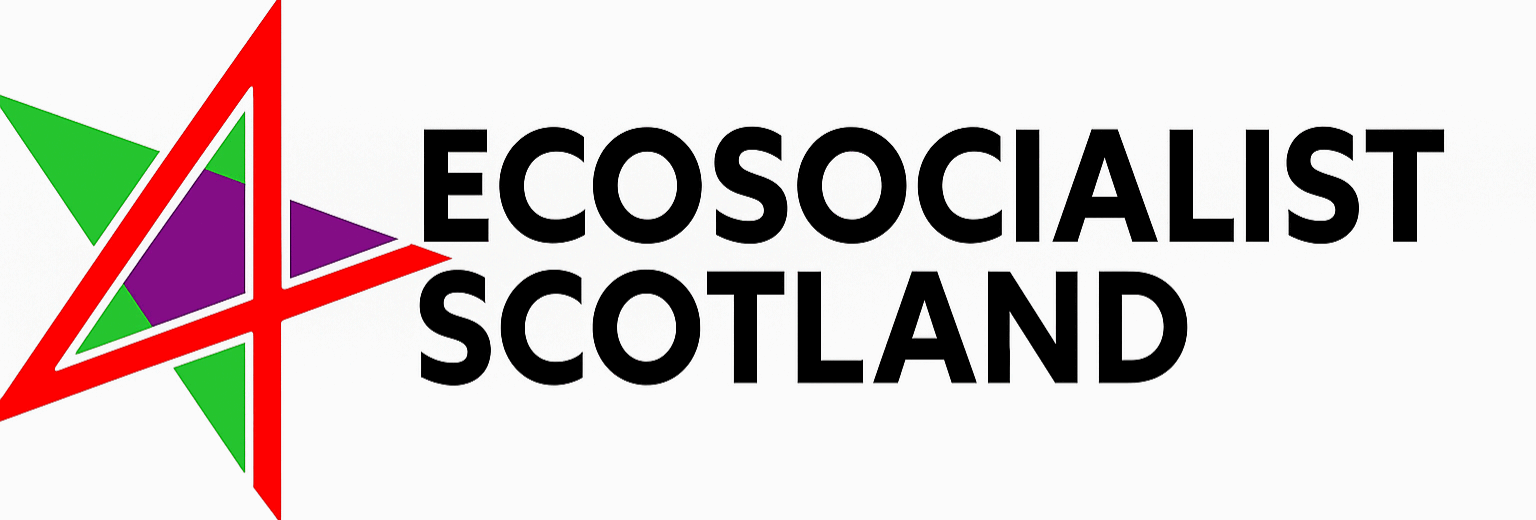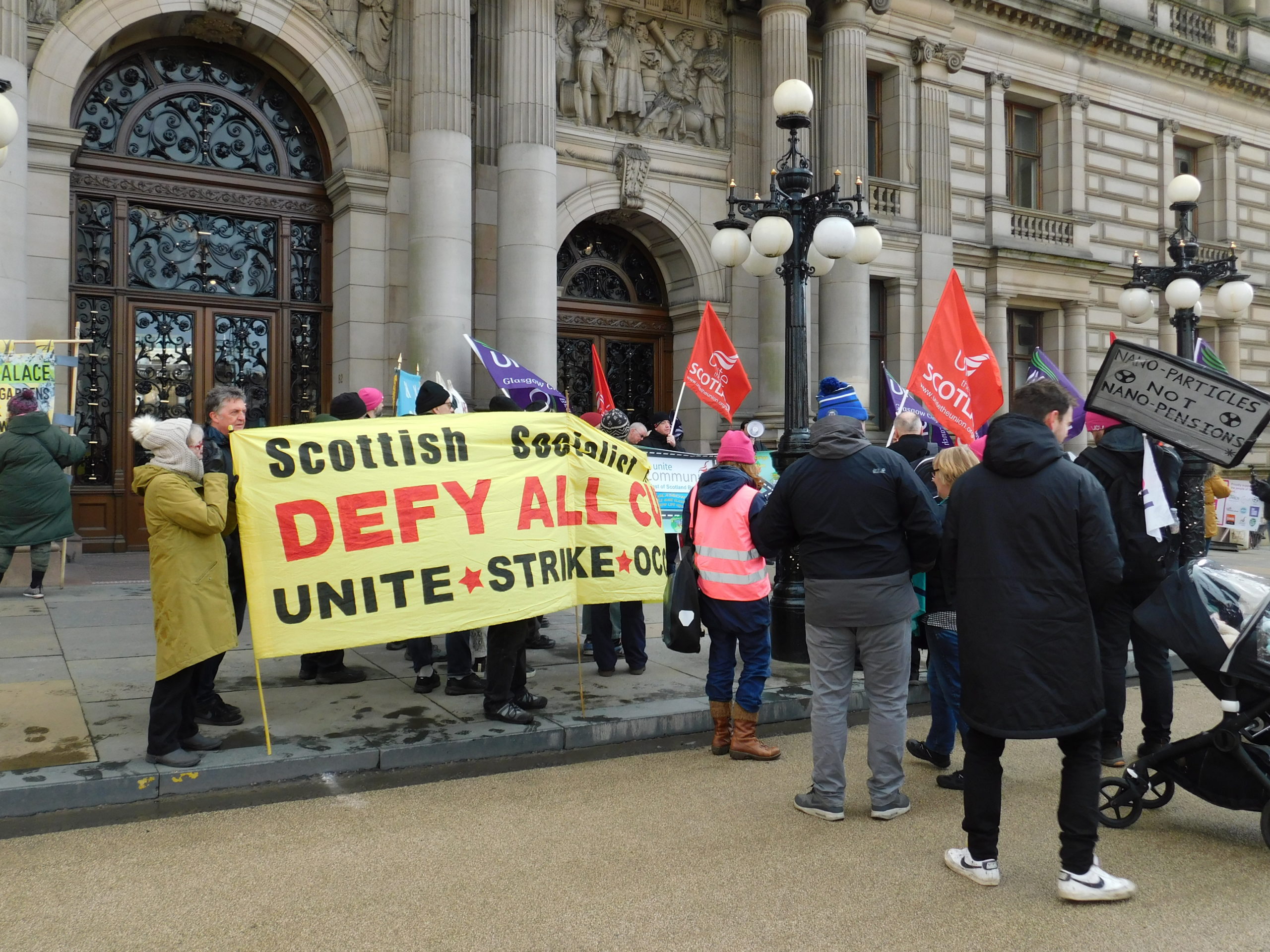Over 50 trade union and community activists braved the storms to attend a protest outside the headquarters of Glasgow City Council, the Glasgow City Chambers in George Square, on 17 February writes Mike Picken for ecosocialist.scot.
The protest was against the budget setting meeting of Glasgow City Council and demanded ‘no cuts’ in council services and support for council workers pay demands in the face of a huge ‘cost of living’ crisis.
Among those attending and addressing the protests were representatives of Glasgow City council worker unions involved in pay disputes – Unite, Unison, GMB – alongside those involved in ‘Glasgow Against Closures’ community groups formed to fight the threatened cuts to the Council’s library, museums and leisure centres and other facilities.
The protest was also attended by representatives of the Universities and Colleges Union at nearby Strathclyde University, currently involved in a strike against university employers over pensions, pay, working conditions and casualisation.
The protest was both part of an ongoing campaign against current cuts and closure plans of the SNP-led Council and the first shots in a battle around council funding in the run-up to the major Scottish Council Elections on Thursday 5 May.
Scottish government has underfunded councils
The Scottish Government has underfunded Councils for a decade as priority has been given to those public services under the direct control of the Government. While it is true that under the current devolution settlement the Scottish Government has been allocated a cash-restricted budget and unlike the UK government is limited under devolution in its ability to raise taxes on the rich or increase borrowing to defend public services, the cuts imposed on Scottish council budgets by the SNP-led government are seriously damaging to Scotland’s working class and most deprived communities. Following the last council elections in 2017, for the first time ever no one party has a majority of control of any of Scotland’s 32 councils with every council having a hotch-potch of minority control or coalition governance. This makes it an easy target for cuts from a Scottish government that does not adequately challenge the UK government’s spending reductions.
Glasgow City Council faces a specific budget crisis due not only to the challenges of being Scotland’s largest city, one of the poorest localities in the UK, and the continuing impact of the Covid pandemic but also due to the ongoing costs of the settlement of the successful equal pay court action brought by unions against the previous Labour council. The SNP-led minority council took office in 2017, as Labour were unceremoniously booted out of office by voters after around 40 years of control. While the new SNP leadership promised to deal with the spiralling costs of the equal pay settlement, they have failed to either introduce an adequate new pay structures or defend council services from cuts. This has resulted in a strike ballot for those on the affected grades by three of the council’s unions – Unite, Unison, GMB – over the issue of a new pay structure. The ballot closes on 1 March and results will be expected shortly, but under the draconian UK government anti-union laws achieving the 50% turnout in a postal ballot in all three unions is a major challenge.
Glasgow community facilities face Council cuts
The SNP-led Glasgow City Council has also been strongly condemned for trying to save money by the closure of community facilities run by the Council’s subsidiary “Glasgow Life”, including local libraries and the iconic Glasgow Green and Peoples’ Palace. The Council’s budget approved at the meeting on 17 February includes as yet unclear cuts in services while “Glasgow Life” continues to try to transfer facilities to so-called community trusts, that are basically privatisation of public services. The budget for the council year from 1 April 2022 was passed by the City Council and includes cuts and a council tax rise of 3 percent. The Scottish Green Party councillors voted for the SNP budget. While Labour councillors claim to be against cuts, Labour’s legacy of 40 years running the City including underpaying women workers resulting in the biggest equal pay court victory in UK history hardly inspires confidence. Their argument that the SNP also voted for discriminatory pay structures introduced by the ruling Labour group is somewhat of an irrelevant diversion from their own leading role in discrimination against women and the mismanagement of the City’s finances. The ongoing battle to defend council facilities against budget cuts is being led by local groups who have united into the “Glasgow Against Closures” network. The battle against cuts and closures will continue.
Scottish Council Pay dispute continues
During 2021 bin workers in the GMB voted for industrial action over their national pay demands and local management of the service striking for a week during the COP26 conference in Glasgow. This resulted in some additional funding from the SNP Scottish Government, concerned at the global image of Glasgow being portrayed. In an important development those descending on Glasgow from the global climate justice movement, particularly Fridays for the Future activist Greta Thunberg, declared their solidarity with the bin workers and supported GMB picket lines. GMB members also marched on the Fridays for the Future demonstration in Glasgow during COP26 in an important display of solidarity for the struggles between climate justice and social justice. The underlying issues surrounding the bin worker strikes, however, have yet to be resolved.
While the national council workers’ pay claim for 2021 was eventually settled very late in the year, the pay claim from 1 April 2022 is still ongoing – council worker unions across Scotland are demanding a £3,000 per year pay rise and a minimum wage of £12 per hour to cope with the Tory cost of living crisis where inflation is now heading for around 7% and gas/electricity costs are heading through the roof. School teachers – members of the Educational Institute of Scotland (EIS) union – have rejected the 2021-22 pay offer and demanded an improved offer; teachers are also drawing up demands for a 10% pay rise from 1 April 2022. While not employed by local councils, teachers in Scotland’s 26 Further Education Colleges are also balloting on strike action and the ongoing disputes over pay and pensions in Scotland’s 19 university institutions are still going on, with University and College Union (UCU) members engaging in strike action across Scotland. The opportunities for a united front by Scottish unions on public sector pay exist.
Crucial Council elections on 5 May
All this forms the backdrop for the Council elections on 5 May. While there will be national issues including the Tory UK government’s cost of living crisis and the battle for Scottish Independence, the elections will also highlight local issues over council finances and cuts. Despite being opposed to the main system for local financing, the Council Tax introduced by the Tories after mass opposition drove the Poll Tax into oblivion in 1991, the SNP have failed in their commitment to abolish the Council Tax and reform council financing despite 15 years of SNP Scottish Governments. Local council services have been increasingly centralised and controlled from Holyrood rather than locally while public finance to Councils has been cut in real terms. The SNP’s proposals for the much vaunted National Care Service is underfinanced and highly centralised. Action passed in legislation in 2019 to enable Scottish councils set up municipally-owned bus services has yet to see the light of day. While free bus travel has now been introduced for those 21 and under, the majority of the population face spiralling public transport costs including 3% fares rises and major service cuts on the ScotRail train network, due to be taken over shortly by the Scottish Government from the failing private operator Abellio. The case for free public transport across Scotland is now urgent as a response to both the climate and cost of living crises.
However there seems little chance of the major changes needed from the continuation of SNP-led governance at local and national level. Labour is ‘under new management’ from the Starmer-supporting Anas Sarwar, but in local politics seems largely to be just rhetorically opposing the SNP without any serious alternative or change from its austerity-driven past. Scottish Labour was during the 1990s the dominant party of Scottish local councils with over half the 1,200 councillors and control of two thirds of the 32 councils. Due to its opposition to Scottish self-determination, it now faces an ongoing and existential crisis among its membership and voters as it continues to languish in third place on around 20% having lost control of all its last remaining councils including Glasgow in 2017. The coalition administration of Labour in 2017 as junior partner with the despised Tories to run Aberdeen City Council was denounced by the Scottish Labour leadership at the time and the nine councillors ‘suspended’; but no further action was taken and the councillors have all been readmitted to the Party recently by its new leadership. The Daily Record has recently reported that the most senior Labour councillor in Scotland has declared her separation from the Party and will stand as an Independent.
The Scottish Greens have a foothold in both government and some local councils, but are not providing an alternative to the SNP. Those opposing the cuts and wanting to see serious change, including decent pay for council workers, need to look elsewhere – though there is little signs of any kind of major electoral alternative being posed across Scotland. The Scottish Socialist Party (SSP) are expected to stand in eight of the 300+ wards across Scotland – including four wards in Glasgow and in Edinburgh, North Ayrshire and Renfrewshire – but that is half what they stood in 2017 and a long way short of the concerted national campaign needed. SSP candidates will be committed to opposing all cuts, supporting the council workers pay demands, abolishing the council tax, free public transport and other aspects of a genuine Red-Green opposition to the Tories at Westminster and the SNP at Holyrood.
It remains to be seen whether a serious electoral opposition can emerge during these elections but the battles in support of unions and community campaigns must go on.
26 February 2022
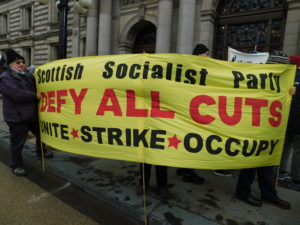
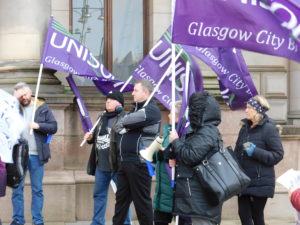
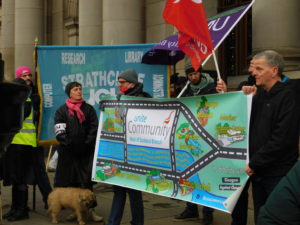
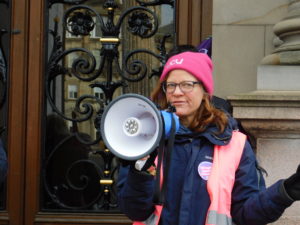
All pictures: Mike Picken
